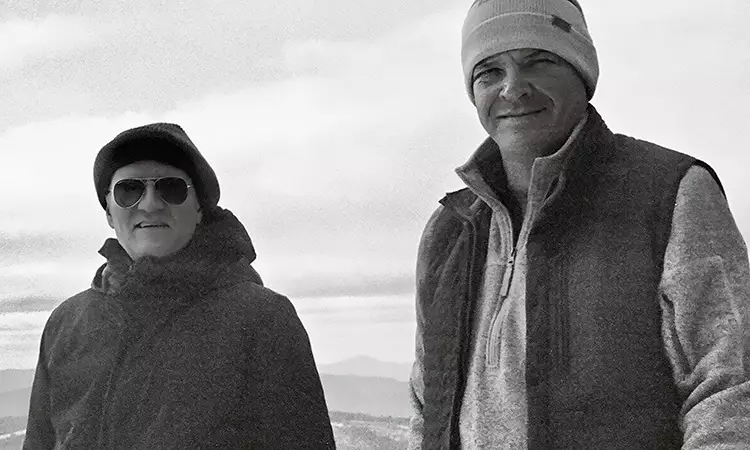In an era where cinematic storytelling often strays into familiar tropes, Nathan Zellner and his brother David have ventured into the untamed wilderness of imagination with their film **Sasquatch Sunset**. This surreal depiction of Sasquatch life encapsulates both a profound journey of survival and an exploration of human experiences through the eyes of the fantastical. As Nathan describes it, the film melds absurdity with poignancy, crafting a narrative that is as rich as the lush forests of North America in which it is set. To truly appreciate the nuances of **Sasquatch Sunset**, one must delve into the cinematic influences that have shaped its vision.
Growing up in an environment steeped in film, the Zellner brothers were profoundly affected by a tapestry of genres and styles. Nathan reflects on their shared childhood memories, highlighting how landmark films sparked both their imaginations and their creative dialogues. This exchange not only forged their cinematic understanding but also paved the way for their collaborative endeavors, culminating in the distinct voice that resonates within **Sasquatch Sunset**.
One pivotal influence on their journey is Stanley Kubrick’s masterwork, 2001: A Space Odyssey. The “dawn of man” scene, an essential touchstone for the Zellners, emphasizes the potent storytelling that can unfold without lengthy dialogue. Kubrick’s ability to convey grand themes through visual storytelling offers an invaluable lesson: sometimes, the best narratives rely on the elegance of silence and imagery. The sheer scale and the visceral reality of early man’s struggle for survival juxtaposed with the modern world’s complexities manifest a richness that **Sasquatch Sunset** channels through its Sasquatch protagonists’ plight.
The Zellner brothers also draw inspiration from the art of character creation in their formative films. For instance, the meticulous makeup and characterization showcased in cinematic classics have always captivated Nathan. These movies, much like **Sasquatch Sunset**, presented fully fleshed-out societies depicted through compelling visuals. The brothers recognize the importance of distinct character aesthetics, based on a crafted narrative world. Even as modern techniques have evolved, the foundational ideas related to character creation resonate in their work, especially reflecting on how creatures and characters can embody societal structures inherent in storytelling.
Their cinematic journey would be incomplete without acknowledging the impact of British comedy—especially the zany brilliance that defines Monty Python. The Zellners revel in the absurdity of humor that the British sketch group famously showcased. This sensibility has inspired them to create humorous, poignant moments that feel unexpected yet perfectly timed. The clever editing and punchline delivery seen in Monty Python resonate throughout their filmmaking approach, thus blending humor with the profound narrative of **Sasquatch Sunset**.
In their college years, the brothers discovered the bold filmmaking of Werner Herzog. The grueling yet rewarding journey experienced during his productions taught them the value of authenticity and adventure in filmmaking. Herzog’s commitment to creating real-life experiences imbued his films with stunning vitality—this ethos profoundly influenced the Zellners. They understood early on that to achieve true authenticity in their Sasquatch narrative, filming amidst the majestic redwoods of California was non-negotiable. Such a backdrop allowed them to connect deeply with the stories they sought to tell.
The deep intertwining of reality and fantasy is further reflected in how they weave humor and pathos into the Sasquatch journey. By contextualizing the film within an authentic setting—where folklore meets existential dilemmas—they establish a bridge that invites viewers into their unique narrative structure.
An undeniable delight lay in their penchant for non-narrative family films, particularly those that follow animal characters through life’s vicissitudes. Nathan recalls films like The Bear, which encapsulates a cub’s journey for survival, resonating with the themes of companionship, loss, and perseverance threaded throughout **Sasquatch Sunset**. This cinematic exploration speaks volumes about the emotional landscapes the brothers wish to traverse. These films not only celebrate adventure but also embrace the vulnerability inherent in life.
The essence of cinema is its ability to evoke feelings and provoke dialogue, allowing audiences to explore themes of existence and identity. The Zellner brothers have adeptly crafted a narrative that invites reflection, showcasing their influences while marking their distinct cinematic territory.
In revisiting the Abenteuer with **Sasquatch Sunset**, viewers are treated to a film that transcends simple entertainment. It embodies a fusion of humor, poignancy, and existential inquiry, driven by the influences that shaped its creators. Nathan and David Zellner, by infusing their work with personal reflections and inventive storytelling, invite us into a world where the surreal not only entertains but enlightens, ensuring their portrayal of Sasquatches—and by extension, the human experience—resonates long after the credits roll. The legacy of their work isn’t just about the story told; it is a testament to the transformative power of cinema itself.

